Key takeaways:
- Classic films serve as reflections of emotional and cultural landscapes, prompting viewers to confront historical complexities and personal identities.
- These films challenge societal norms and offer timeless insights into human relationships, community, and personal struggles.
- Popular classic films like “Casablanca,” “Gone with the Wind,” and “The Wizard of Oz” continue to resonate through themes of love, resilience, and self-discovery.
- Streaming platforms like Criterion Channel and TCM facilitate access to classic cinema, keeping their relevance and lessons alive in contemporary storytelling.
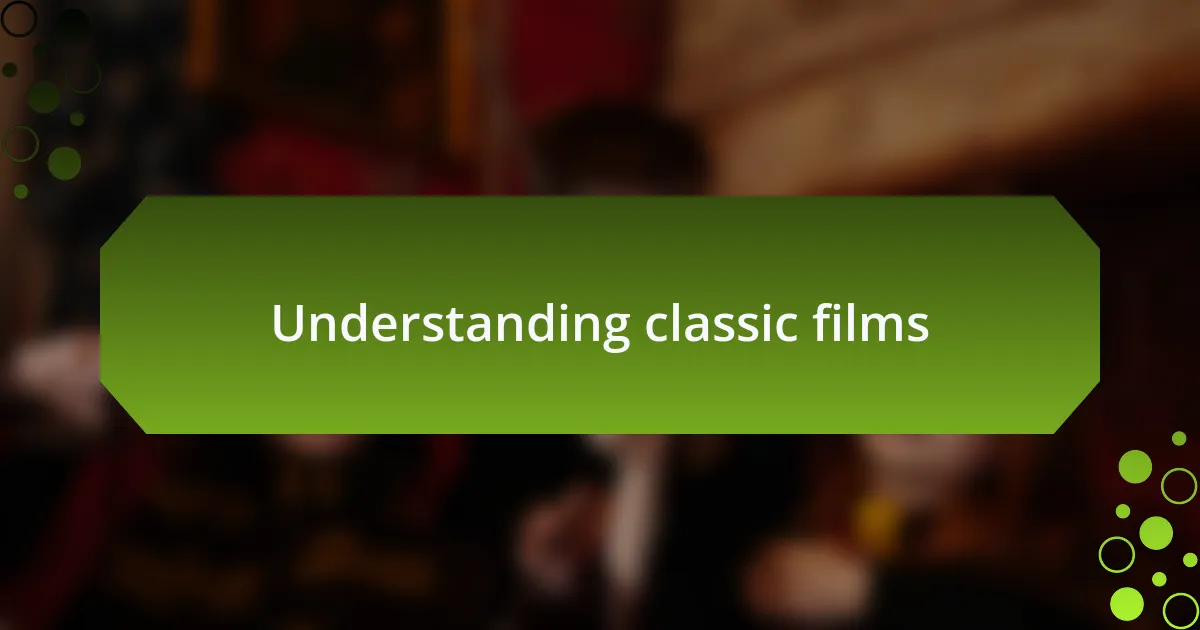
Understanding classic films
Classic films are more than just stories—they’re windows into the emotional and cultural landscapes of their time. I remember watching “Casablanca” for the first time and being struck by how the characters seemed to navigate love and sacrifice against the backdrop of war. It made me wonder: how do the struggles depicted in those films resonate with our own experiences today?
When I delve into films like “Gone with the Wind,” I can’t help but feel a mix of admiration and discomfort. The grandeur of the South portrayed in the film is captivating, yet it also prompts me to reflect on the complexities of history and representation. How do these narratives shape our understanding of identity and the past? It’s a bit unsettling, but it sparks crucial conversations.
Engaging with classic cinema often requires us to confront both the artistry and the flaws inherent in those works. I’ve seen how films like “The Graduate” tackle themes of disillusionment with a sharp wit that remains relevant. It leads me to ask: what can we learn from the mistakes and triumphs in these stories? The lessons transcend generations, reminding us of the persistent dance between aspiration and reality.
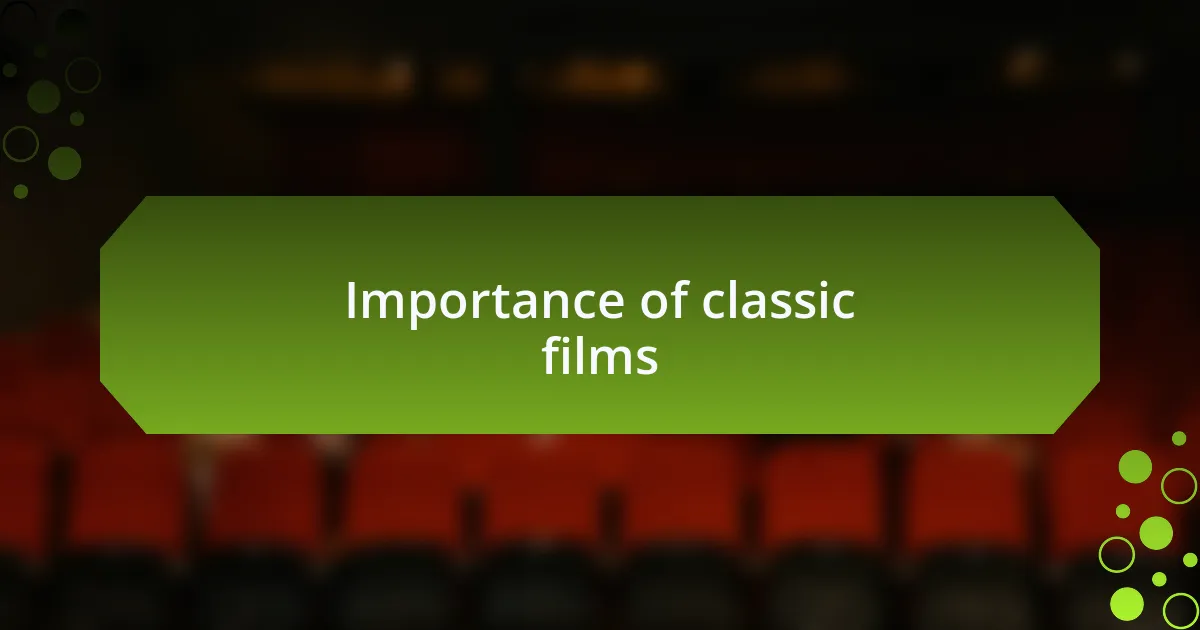
Importance of classic films
Classic films hold a unique value in our cultural landscape, often serving as a bridge to understand our collective history. I recall the first time I watched “12 Angry Men,” and it struck me how a single room could encapsulate the complexities of justice and moral dilemmas. It begs the question: how do these narratives shape our perceptions of fairness and responsibility in today’s society?
The emotional depth in classic films can profoundly impact our understanding of human relationships. After viewing “It’s a Wonderful Life,” I found myself reflecting on the importance of community and connection in my own life. It made me wonder: how often do we take a step back to appreciate the roles we play in the lives of others, and how do these films remind us of that responsibility?
Moreover, classic films often challenge us to confront societal norms. Watching “Rebel Without a Cause” as a teenager, I felt a surge of rebellion and questioning of authority that mirrored my own struggles at that age. It really makes me think—are these portrayals just a product of their time, or do they offer timeless insights into the search for identity and belonging?
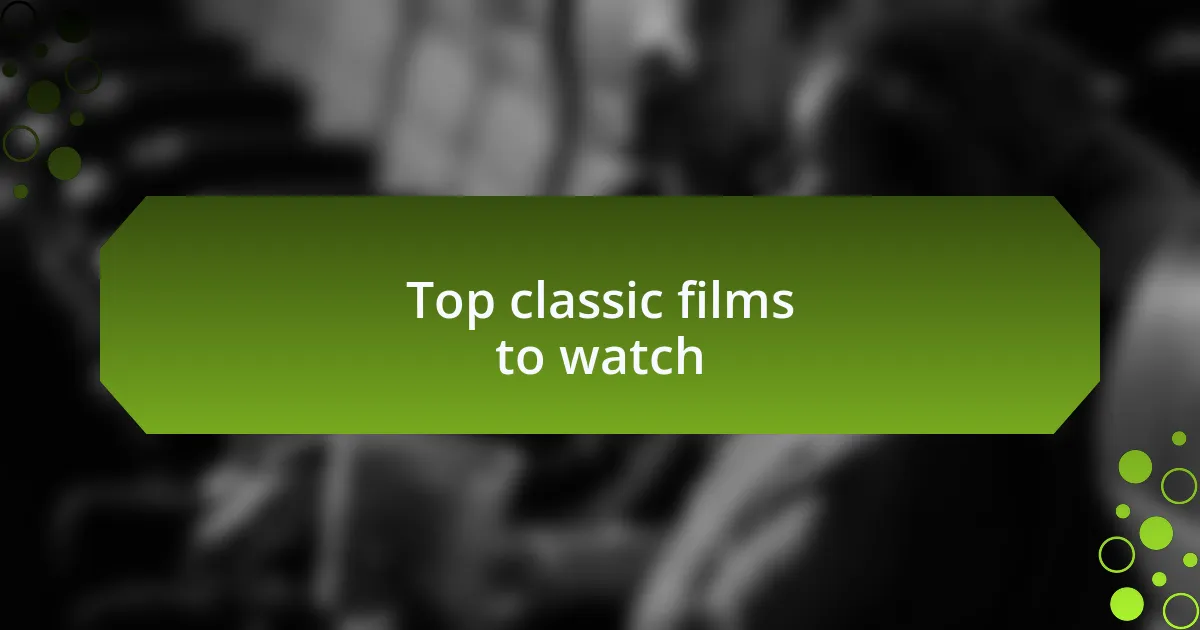
Top classic films to watch
When it comes to classic films, one title that stands out is “Casablanca.” The first time I experienced its blend of romance and sacrifice, I was captivated by the moral choices the characters faced. It forced me to consider—how far would I go for love and loyalty? This film continues to resonate today, reminding us of the complexities of human emotion against the backdrop of historical turmoil.
Another gem to explore is “Gone with the Wind,” a film that not only portrays a tumultuous love story but also delves deep into themes of resilience and survival. Watching Scarlett O’Hara’s fierce determination inspired me in my own challenges, making me ask—do we truly appreciate the strength within ourselves until faced with adversity? The film beautifully encapsulates the struggles of a bygone era while still speaking to the human spirit.
Lastly, I can’t overlook “The Wizard of Oz.” Its whimsical journey through Oz is much more than a fairytale; it’s an exploration of self-discovery and courage. I vividly remember being mesmerized by Dorothy’s quest, pondering—how often do we overlook the power of home and family in our pursuit of dreams? The timeless messages woven throughout this classic continue to inspire both young and old, solidifying its place in cinema history.
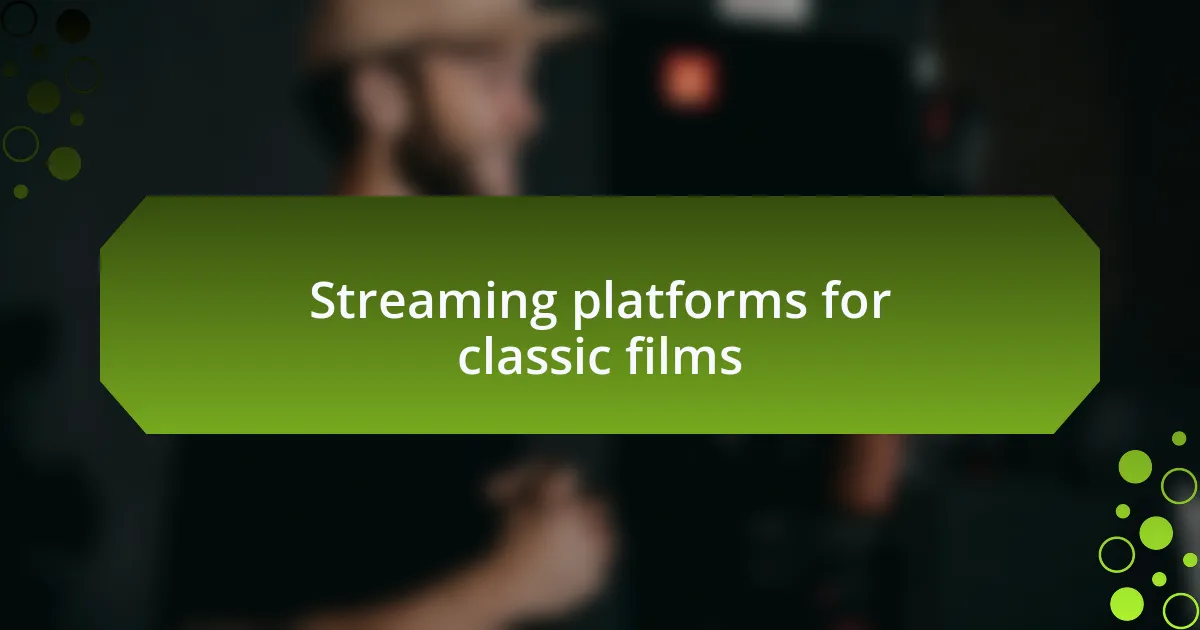
Streaming platforms for classic films
When it comes to streaming classic films, platforms like Criterion Channel stand out. I remember the first time I browsed their extensive library filled with carefully curated classics. Each selection transported me into a different era, making me wonder—how can a film from decades ago still feel so relevant today?
Then there’s Turner Classic Movies (TCM) On Demand, which combines nostalgia with convenience. I often find myself reminiscing about the late-night viewings of classics that shaped my love for cinema. Watching these films on TCM not only fuels my passion but also leads me to ponder—what makes a film timeless?
Lastly, don’t overlook the classic offerings on Netflix and Hulu. While they primarily focus on new releases, their occasional inclusion of beloved classics is a delightful surprise. I often catch myself rewatching favorites like “12 Angry Men” or “Psycho,” and it makes me think—how do these films continue to influence modern storytelling? These platforms, despite their limitations, remind us that classic cinema is just a click away.
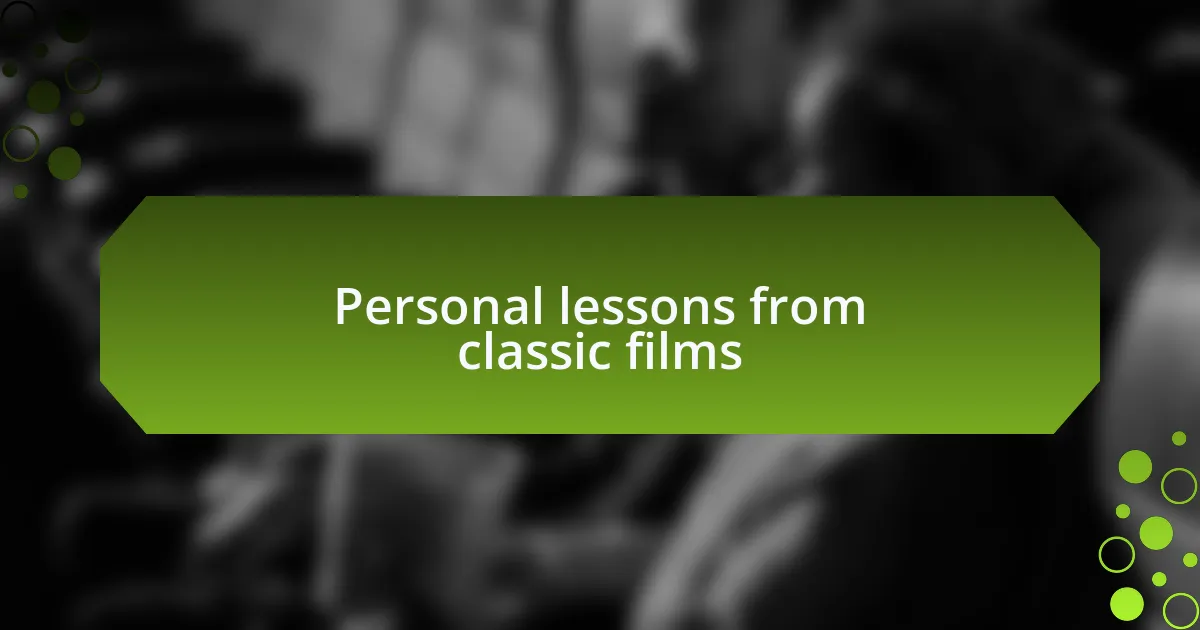
Personal lessons from classic films
Classic films have a unique way of imparting life lessons that stay with us long after the credits roll. For instance, after watching “Casablanca,” I found myself reflecting on themes of sacrifice and love. It struck me how sometimes, the hardest choices we make can be the ones that define us, and I often wonder—are we willing to make similar sacrifices in our own lives?
One of my favorite takeaways from “To Kill a Mockingbird” is the importance of empathy. Every time I see Atticus Finch stand up for what is right, it inspires me to confront my own biases and to see the world through others’ eyes. This film constantly reminds me to ask—how can I approach challenges with more understanding and compassion?
Then there’s “The Wizard of Oz.” Watching Dorothy’s journey always brings me back to the notion of self-discovery. I realize that, like her, we often have the power to create our own paths, even when the way seems unclear. I frequently catch myself pondering—what unique qualities do I have that I might be overlooking on my journey?